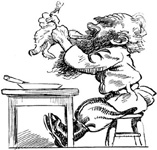
Why the Entertainment Industry Is Bad for Children
WHAT EVER HAPPENED TO GOOD OLD-FASHIONED FUN?
Those of us who grew up in the 1940s and 1950s recall fondly the improvised games and spontaneous fun we as children created through the use of our imagination. The word “bored” was not part of our vocabulary, and organized athletics like Little League did not dominate our lives. With one good bat, an old baseball, and a few gloves to be shared among us, we initiated, organized, and officiated our own games, with no need for adult supervision or arbitration. When the inevitable disagreements arose about whether a ball was fair or foul or a runner was safe or out, we settled the matter with a game of odds and evens — one player from each team making a throw of fingers and the sum deciding the issue. We did not expect adults to entertain or amuse us — or whine about our having nothing to do. Other than imploring our parents to drive us to the lake or the beach on a sultry summer day, our fun was primarily our own invention. The benefits of a simple childhood — uncorrupted by the entertainment industry or amusement business — were a strong imagination, a love of adventure, a spirit of creativity, and the enjoyment of pure fun.
What has happened to this normative experience of childhood and youth, one that is depicted in many classics of children’s literature, like Twain’s Life on the Mississippi and Alcott’s Little Women? In these 19th-century works, life is grounded in reality, nature, and the family — life is lived in an authentic way. For Mark Twain “the great Mississippi, the majestic, the magnificent Mississippi rolling its mile-wide tide along, shining in the sun” becomes the source of fun, excitement, and adventure. One is never at a loss for things to do. For the March sisters in Little Women childhood means creative play: They pretend they are members of the Pickwick Club, dress up and go on picnics, compose a weekly newspaper, and enjoy outdoor recreations like skating and croquet. The source of fun originates in the innocent, carefree, imaginative lives of the young, not in the entertainment industry or in activities organized by adults. The pure joys of childhood are not expensive manufactured products or marketed consumer items.
In Robert Louis Stevenson’s A Child’s Garden of Verses, the child enjoys such simple pleasures as playing with the water by the sea, delighting in the burning leaves of autumn, beholding the eggs of birds in the spring, playing in the hayloft in the summer, making tracks in the snow in winter, looking at picture books by the fireside, and playing make-believe with his “unseen playmate,” his imagination. Twain, Alcott, and Stevenson show that in a happy, normal childhood the sources of fun are inexhaustible and never-ending. As Stevenson writes, “The world is so full of a number of things,/ I’m sure we should all be as happy as kings.” The world is a palace or castle teeming with wonders and riches that are boundless in their variety. The world is a kingdom of play, the child a monarch blessed with treasures, and life an abundant cornucopia of joy.
The modern experience of childhood, however, is often an impoverishment of the spirit and imagination, a drab, joyless world where there is “nothing to do” or everything is “boring.” Why? As organized sports compete with spontaneous play, as television viewing inhibits the habit of reading, as daycare institutions replace life in a family, children do not develop a rich inner life or creative spirit. They do not learn to look within or discover the power of imagination, but depend upon the external stimulation of video games, movies, television, radio, and such. With no inner life or imaginative spirit, the realm of the soul remains undiscovered and one’s sense of reality is reduced to the material, the physical, and the ephemeral. According to Josef Pieper, boredom “is directly related to inability to enjoy leisure, for one can only be bored if the spiritual power to be leisurely has been lost.” As the entertainment industry replaces the spiritual power of leisure in a child’s life, mass-produced recreation fills the void created by the absence of imaginative play, good literature, and the art of conversation, and thus banality and sensationalism abound.
You May Also Enjoy
Fox TV, the neocons' heaviest cultural artillery, has done some of the greatest damage to the conservative cause in the culture wars.
TV news is becoming the best place to tell our story. It offers opportunities for believers to express their faith in a prime time context.
The Department of Defense wants to sell pornography, and even though the law prohibits them, they found a way to do it.

